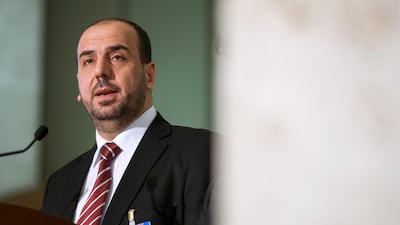Saudi Arabia plans to host a meeting of Syrian opposition groups in October in an attempt to forge a unified front in negotiations to end the war and effect a political transition.
The planned meeting was confirmed by Nasr Al Hariri, a spokesman for the Syrian opposition’s High Negotiations Committee.
Mr Al Hariri said the meeting was being held at the HNC's request to “unite the ranks of the opposition”.
Currently two other groups, known as the Cairo and Moscow platforms, also claim to represent the Syrian opposition and have attended UN-brokered peace talks in Geneva alongside the HNC.
The HNC itself was formed in Saudi Arabia in 2015 to replace the Syrian National Coalition, which preceded it as the internationally recognised representative of the Syrian opposition. The SNC was beset by infighting and criticism that it was dominated by only a small number of opposition factions. Although the HNC has included a greater number of groups, it has also suffered from similar accusations.
The next round of UN-sponsored peace talks are tentatively scheduled for September in Geneva, though as of Monday, the dates had not been set.
“We are still consulting with the parties,” said Michael Contet, a spokesman for Staffan de Mistura, the UN special envoy to Syria.
Mr Al Hariri said the HNC had not yet received an invitation for the September talks.
___________________________________________________
Read more:
- Veteran prosecutor Carla Del Ponte quits Syria inquiry panel
- Syria's refugees are losing hope of going home
___________________________________________________
Besides the issue of opposition unity, the UN-backed negotiations to end Syria's six-year-old war have repeatedly stalled over the issue of a transition of power.
Regime negotiators have refused to address a succession to the Bashar Al Assad government while the opposition insists the negotiations focus on the political transition endorsed by the UN in the 2012 Geneva Communique and Security Council resolution 2254 passed in 2015.
Saudi Arabia, a key opposition supporter, on Monday reiterated its stance that Mr Al Assad could not remain in power under any peace process, denying reports that it would not insist on his departure.
There is “no place for Assad in Syria’s future,” a Saudi foreign ministry official said.
"The Kingdom's position is … based on the principles of the Geneva Declaration and United Nations Security Council Resolution 2254, which provides for the formation of a transitional authority to govern the country," the official told the Saudi state news agency SPA.
The upcoming opposition meeting in Saudi Arabia and another reportedly planned in Turkey the same month, come at a time when the United States is showing more flexibility on Mr Al Assad's political future and amid a Russian push to end the conflict through separate peace talks in the Kazakh capital Astana.
A US State Department official told The National on Monday that while president Donald Trump's administration "does not see Bashar Al Assad as having a role in the future of Syria … it is up to the Syrian people to decide".
“We believe the Syrian people must decide their own future through a political process that is credible, legitimate, and transparent,” he said, adding that such a process would likely “chart a new course for Syria with new and credible leadership”.
The change of tone and language in the US position, six years after former president Barack Obama called on Mr Al Assad to step down, shows that “we are definitely headed toward implicit acceptance of him staying for now in power,” said Faysal Itani a resident senior fellow with the Atlantic Council's Rafik Hariri Center for the Middle East.
Mr Itani said the shift was driven primarily by the new ground realities in the Syria conflict and the US desire to shift focus to Iran instead of Mr Al Assad.
“There is a US recognition of the new military realities,” said the expert, noting that “the Military Operations Command [a US rebel coordination unit based in Jordan] is being dismantled and re-purposed into a counterterrorism or border patrol force”. This means the “US is coming to terms with the regime dominance over the centre [of Syria] and Deir Ezzor city".
Another factor is the shift in focus to Tehran's role and attempting to break up the Russian-Iranian alliance in the conflict. The US secretary of state Rex Tillerson said last week that “Iranian military forces inside of Syria must leave and go home”.
“Whether those are Iranian Revolutionary Guard forces or whether those are paid militias, foreign fighters, that Iran has brought into Syria in this battle”, their departure from Syria is an “end state condition” for the US administration, Mr Tillerson said.
Mr Itani said that while “this is what the US would like to see happen”, in reality “they still have no means to bring it about yet”.
The US however continues to support a coalition of Kurdish and Arab militias in Syria as part of its battle against ISIL. The Syrian Democratic Forces are currently fighting to take the extremists' self-declared capital of Raqqa, and closing in on Deir Ezzor, one of the last areas controlled by ISIL in Syria, from the north.
This puts them on course for a conflict with Syrian government forces and allied militia that are approaching from the east with the support of the Russian military.
So far the most successful peace initiatives in Syria have taken place at the local level, with the most recent being three Russian sponsored “safe-zones”, one of which was negotiated along with US backing. On Monday, however, the Syrian Observatory for Human Rights, which monitors the conflict, reported ceasefire violations in all three of those areas on Sunday.
Joyce Karam reported from Washington

